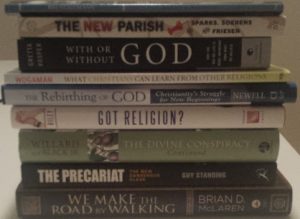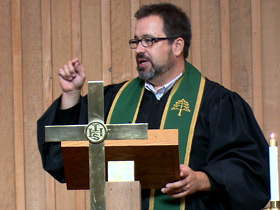The last few weeks have been a time of transition for me. I have used the occasion to read the books in my "must read" stack, which had been growing for some time. They follow in the order I have rated them (using a 1-5 scale). (5+) The Rebirthing of God: Christianity's Struggle for New Beginnings by John Philip Newell (2014) (5) We Make the Road by Walking by Brian D. McLaren (2014) (5) Sabbath as Resistance: Saying No to the Culture of Now by Walter Read More …
Sermon: The Next Chapter (#1450)
Ephesians 2:14-22 (The Message) Sermon Excerpt A few weeks ago, Susan and I participated in Hodges University’s annual commencement ceremony. As professors, we know quite well how much the graduating class and their families look forward to that special occasion. This year we listened to remarks from a member of the graduating class and from a faculty member. While those short addresses were interesting, the one speech this year’s graduates are most likely to remember is the Read More …
Summer Shifts (#1449)
Summer has always been one of my favorite seasons of the year. It is also a time when many people temporarily shift their normal routine. I will be making shifts in several areas for the summer, including: Blogging I have published one blog post a day for the last 10 months, and a total of 1,450 since launching this blog in 2009. This will be my last daily post for the summer. I will continue to post on occasion rather than taking a month off as I did last year (a much Read More …
Sermon: Be A Quitter (#1448)
Sermon Text: I Corinthians 1:10-17 (The Message) Sermon Excerpt Churchy Christians often say, “Wherever two or three are gathered in God’s name, God is present.” While they are likely right, practical Christians recognize that wherever two or three are gathered, many perspectives are present. And somehow, more often than we care to admit, extended conversations that highlight our differences turn into arguments. Good Christian people have been known to argue about nearly Read More …
Pulpit Plagiarism (#1447)
Plagiarism is a word I hear far more often on the university campus than on the church campus. It is, however, one that deserves attention in both arenas. Sarah Pulliam Bailey recently asked the question, "Is pulpit plagiarism on the rise?" in response to several recent incidents in which well-known pastors were caught plagiarizing content for sermons, radio broadcasts, newspaper articles, and/or books. Some of the pastors attracting attention of their plagiarism include Mark Read More …
Friday Fun: Church Laws (#1446)
Most people welcome something fun or, better yet, funny as the end of a work week approaches. Rather than deal with the touchy topic of Friday the 13th, I instead share a few of the strangest church laws found in our land. In Boston, it is against the law to eat peanuts while in church. In Omaha, it's illegal to sneeze or burp during a church service. In Texas, it is illegal to go to church in disguise. In Mississippi, private citizens Read More …
Challenging Classism (#1445)
Cynthia Rigby, Professor of Theology at Austin Presbyterian Theological Seminary, recently proposed that churches develop "concrete ways of challenging classism and promoting economic justice." She recommends that they accomplish this by honestly reflecting on the ways they themselves are complicit in fostering classism, and repenting of their own classist ways and re-committing themselves to being communities that do not privilege those who are richer over those who are Read More …
The End of Interim Ministry? (#1444)
Later this month I will conclude a 10 month interim role as the Senior Minister of United Church (Marco Island, FL): a congregation affiliated with the National Association of Congregational Christian Churches and the United Church of Christ. This year long journey has afforded the congregation an opportunity to process the past, understand the present, and prepare for the future. I firmly believe it will enable the new settled minister to begin well from day one knowing that folks Read More …
Fandom is Killing the Church (#1443)
Mark Sandlin, co-founder of The Christian Left and owner of TheGodArticle.com, recently suggested that the fandom of God is slowly killing the church. More specifically, he argues When we are fans of Jesus rather than followers of Jesus, our focus is inward turned, like in fandoms, concerned with and finding full satisfaction in what we think and feel and believe. We are more interested in who gets to be labeled insiders, who are "real/true" fans of God, than we are with Read More …
Monday Morning Sermon Quarterbacking (#1442)
Monday morning quarterbacking happens around the brunch/lunch table on Sunday, at the watercooler on Monday, and in so many other social gatherings throughout the week. Many sports fans engage in conversation about how they, in hindsight, would have done things differently in the big game (assuming they had been the coach). Likewise, many worship participants like to critique their minister's sermons in some form of post-worship conversation that often suggests a different preaching Read More …









